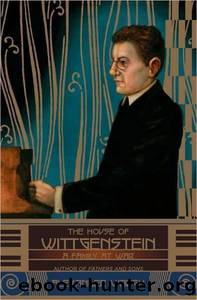The house of wittgenstein: a family at war by Alexander Waugh

Author:Alexander Waugh [Alexander Waugh]
Language: eng
Format: epub
Tags: Biographie
ISBN: 9780385520607
Published: 2009-02-24T05:00:00+00:00
RUSSIA AND RAVEL
Marga went to New York in September 1927 to raise money for Lady Margaret Hall in Oxford, and took with her some records of Paul playing music by Josef Labor with the violinist Marie Soldat-Roeger, which had been made under the auspices of Clara Wittgenstein. Clara (who was three years younger than Karl) was an outstanding maiden aunt who took a special interest in the well-being of her nephews and nieces. Like Gretl she entertained composers and artists and staged private concerts in her spacious flat on the Salesianergasse, at an old Imperial shooting lodge at Laxenburg, and at her summer farmhouse in Thumersbach. Phonograph records, she insisted, were extremely important to an artist's career.
In New York, Marga succeeded in sowing the seeds for a U.S. tour for Paul during which the highlight would be a performance of Strauss's Panathenaenzug at Carnegie Hall with the Beethoven Symphony Orchestra under the baton of its founding conductor, George Zaslawsky. On October 31, 1928, Paul performed the Bortkiewicz Concerto in Bucharest, expecting to leave for America two days later, but when news reached him that a sold-out concert of the Beethoven Orchestra at the Carnegie Hall had been suddenly dropped, he decided not to travel. Two reasons were given for the cancellation in New York. On the one hand, Zaslawsky claimed to have suffered a heart attack and on the other his featured violin soloist, Paul Kochanski, was said to have pulled out because his fee had not been paid. The two may have been related. In any case Zaslawsky refused to pay any refund to disgruntled ticket holders and within a few weeks he and his orchestra had filed for bankruptcy.
The successes of Paul's commissions had inspired many young composers to send him unsolicited proposals, suggestions or even complete scores of works they had written for the left hand. They also encouraged figures of higher distinction to join the Wittgenstein carnival. In June 1924, Leopold Godowsky signed a contract for $6,000 (half on signature, half on delivery) for a left-handed piano concerto, but panicked--because he had no experience of orchestration--and in the end offered a masterful caprice on themes from Johann Strauss's Gypsy Baron for $3,000. Godowsky wrote to his wife, "It is good music--very likely too good for Wittgenstein." Paul performed it only once.
In his contracts with Korngold, Schmidt, Strauss and Bortkiewicz, Paul had insisted that the contractual details be kept secret. The musical world may have guessed that large sums were involved, but even those young composers who knew nothing of it were excited at the prospect of association with Paul Wittgenstein. Some of their works he performed. In February 1925 he premiered a paraphrase of "Tales from the Vienna Woods" for piano and orchestra by Eduard Schutt in the Musikverein-saal; a Serenata and Perpetuo Mobile by the blind composer Rudolf Braun led to a commission for a full-scale concerto; a quartet by Hans Gal, which Paul described as "nothing remarkable," was premiered in March 1928 and a concerto by Karl Weigl was rejected.
Download
This site does not store any files on its server. We only index and link to content provided by other sites. Please contact the content providers to delete copyright contents if any and email us, we'll remove relevant links or contents immediately.
Should I Stay or Should I Go? by Ramani Durvasula(6848)
The Lost Art of Listening by Michael P. Nichols(6527)
The Rosie Project by Graeme Simsion(5234)
We Need to Talk by Celeste Headlee(4918)
Beartown by Fredrik Backman(4486)
Suicide Notes by Michael Thomas Ford(4299)
Hunger by Roxane Gay(4257)
Ego Is the Enemy by Ryan Holiday(4042)
I Love You But I Don't Trust You by Mira Kirshenbaum(3266)
Mummy Knew by Lisa James(3187)
Crazy Is My Superpower by A.J. Mendez Brooks(2886)
Girl, Wash Your Face by Rachel Hollis(2847)
The Complete Idiot's Guide to Coping With Difficult People by Arlene Uhl(2844)
Toxic Parents by Susan Forward(2833)
Not a Diet Book by James Smith(2769)
The Hard Questions by Susan Piver(2571)
Name Book, The: Over 10,000 Names--Their Meanings, Origins, and Spiritual Significance by Astoria Dorothy(2514)
The Gaslight Effect by Dr. Robin Stern(2371)
The Social Psychology of Inequality by Unknown(2344)
